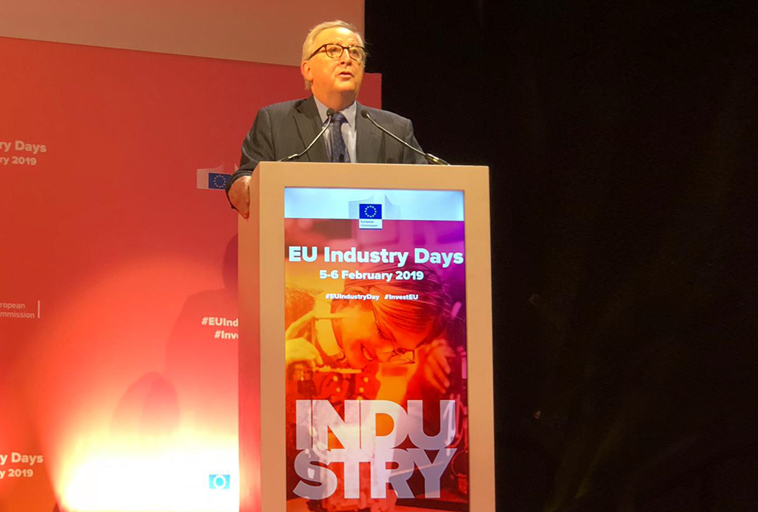
BEDA at high level EU Industry Days
EU Industry Days, first organised by the European Commission in 2017, is a high level inivation only initiative to engage with big and small business from priority sectors across Europe to engage, inspire and collaborate. In our first appearance at EU Industry Days, BEDA facilitated an interactive workshop with 60 representation from industry, government and research organisations from across Europe — the only stakeholder session in the event organised by design and creative industries.
The plenary session was opened by the Commission President, Jean-Claude Junker, who focused on the Commission’s economic ambitions until 2027.
“We need to redesign our trade for the global economy.”
Jean-Claude Junker, European Commission President
Of course, Junker wasn’t thinking about design in the way that we think about design – as a tool to bring innovation to the market and support the private and public sectors to better respond to user needs. He outlined the challenges of bridging the gap between R&D and the market focusing on the lack of digital skills in Europe. Alarmingly, 44% of Europeans are estimated to lack digital skills.
“I want to see a European country toping the innovation leader boards.”
Kristalina Georgieva, Interim President of the World Bank Group
Europe is languishing behind Asia and America and only a radical innovation policy will change this. The Interim President of the World Bank Group, Kristalina Georgieva, further highlighted how digital platforms are transforming well-established firms in the banking sector, hotel industry and transport services – referring to innovators like Monzo, Airbnb and Uber. Intriguingly many of the fastest growing companies around the world, including Airbnb, were co-founded by designers. Design is the difference in these offers both in terms of the business models and user experience.
In the past five years, 70 design and creative agencies have been acquired by global multinationals Accenture, Airbnb, Capital One, Deloitte, EY, Facebook, Google, KPMG, McKinsey and PWC building their internal capacity to deliver design solutions (Maeda, 2017). It is noteworthy that these acquisitions have more often than not taken place in the United States. It is time for Europe to better capitalise on what design can offer.
BEDA’s mission is for design to be embraced as a driver of growth and prosperity across Europe. Our workshop on design as an intangible asset creation attracted 60 participants with equal representation from industry, government and research. Representatives from industry included healthcare technology companies, participants from government included European Commission, policy-makers from Finland, Denmark and Slovenia among others as well as researchers leading the circular economy agenda in Europe.
The workshop kicked off with introductions by Bart Ahsmann BEDA President and Paivi Tahkokallio, BEDA President-elect outlining the journey to BEDA integrating design into Innovation Union and the subsequent Action Plan for Design-driven Innovation. Dr Anna Whicher highlighted current trends in design action plans in Europe. According to BEDA’s recent European Design Report 2.0, there have been 11 design policies/action plans adopted by European Member States governments. BEDA is seeking to reinvigorate discussions on design policy at European, national, regional and city levels. Our workshop at EU Industry Days was part of this ambition. Based on a card sorting exercises with compilation of design policy actions across a number of thematic areas the participants explored various actions and prioritised them according to higher priority, lower priority and shorter term, longer-term. The results of this workshop will be combined with similar workshops that BEDA has led as part of other events. The emerging priorities from this session were:
- Implementing support programmes to foster collaboration between designers and enterprises.
- Using design to simplify funding application procedures and improve access to financing.
- Using design to instigate a dialogue on the future of the European labour market.
- Reviewing public procurement processes to ensure access to innovative design solutions.
- Creating a legal framework for design that strengthens understanding use.
- Establishing multi-disciplinary innovation labs, using design methods to co-design better public services and policies.
- Conducting research on the design sector, design use in Europe and the economic impact of design.
- Increasing design literacy in early childhood education, primary and secondary schools.
- Applying design methods in multidisciplinary research and innovation programmes to address societal challenges.
The journey towards raising design up the European policy agenda will continue as part of events organised for BEDA’s 50th anniversary on 16 May in Brussels and 5 December 2019 in Helsinki. Be part of the story…
Dr Anna Whicher, BEDA Board Member

